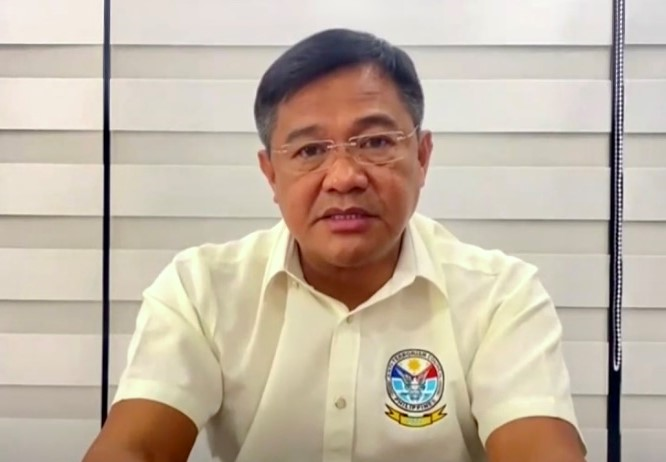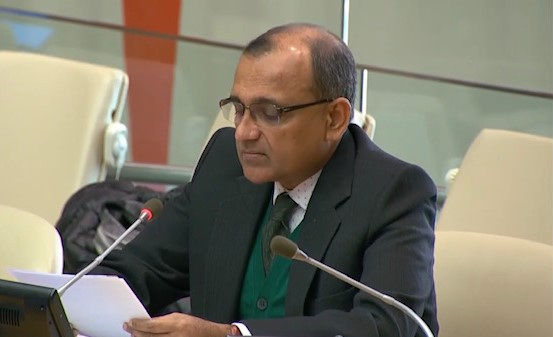

Undersecretary Camilo Pancratius Cascolan (left), Executive Director of the Anti-Terrorism Council-Project Management Center, shared the next steps in the country’s international cooperation in countering terrorism in an open briefing of the Security Council Counter-Terrorism Committee chaired by Ambassador T.S. Tirumurti (right), Permanent Representative of India to the United Nations (Photo Credit: UN WebTV)
UNITED NATIONS, NEW YORK, 14 February 2022– Undersecretary Camilo Pancratius Cascolan, Executive Director of the Anti-Terrorism Council-Project Management Center (ATC-PMC), highlighted progress in the Philippines’ counter-terrorism measures at the United Nations Security Council today.
In a recorded message, Undersecretary Cascolan spoke at the open briefing of the United Nations Security Council Counter-Terrorism Committee (CTC) on “The work of the Counter-Terrorism Committee Executive Directorate (CTED) with the Member States of South and South-East Asia pursuant to Security Council resolution 2395 (2017).” He said that progress in the country’s fight against terrorism is also a result of the cooperation of the Philippines with the United Nations.
The aim of the open briefing was to facilitate discussions on the current and evolving threat of terrorism in South and South-East Asia, especially in light of the evolving situation in Afghanistan. It was also a forum to identify progress achieved and gaps in implementing the relevant Security Council resolutions and international standards; and to inform the Committee about CTED’s efforts to facilitate technical assistance delivery in accordance with requests of Member States and the Committee’s recommendations.
Undersecretary Cascolan apprised the Committee on the Philippines’ counter-terrorism measures based on the recommendations from CTED’s visit to the Philippines in 2019. He cited the Philippines’ major steps in counter-terrorism legislation with the passage of the Anti-Terrorism Act of 2020 (Republic Act 11479), and the strengthening of the Anti-Money Laundering Act of 2001 (Republic Act 11521 of 2021).
According to Undesecretary Cascolan, “These new legal measures ensure the country’s compliance with our obligations under United Nations Security Council Resolution 1373 (2001), other pertinent resolutions and international legal and policy frameworks on counter-terrorism.”
He also cited the Philippines’ National Counter-Terrorism Strategy.
“The strategy sets forth priority actions that are anchored on the United Nations Global Counter-Terrorism Strategy, emphasizing the first and fourth pillars of the global pact: addressing the conditions conducive to the spread of terrorism, and human rights, and rule of law, respectively,” Undesecretary Cascolan said.
The Philippines joined other presenters from South and Southeast Asia on the session on “Progress achieved, challenges, needs and ways forward,” which included India, Indonesia, and the Maldives.
In general, South and Southeast Asia states have made significant progress in strengthening their counter-terrorism capacities since the adoption of Security Council resolution 1373 (2001). Measures introduced have focused on counter-terrorism legislation, countering the financing of terrorism, law enforcement and border controls (including maritime and aviation security, immigration, and intelligence-sharing), as well as on international, regional, and subregional cooperation.
Ambassador and Permanent Representative T.S. Tirumurti of India, Chair of the Security Council Counter-Terrorism Committee, recalled developments in South and Southeast Asia and also underscored that serious concerns remain, noting that Afghanistan may become a safe haven for Al Qaeda and other terrorist groups in the region.
Undersecretary Cascolan stressed the importance of cooperation given these developments, “It is imperative that we bolster our cooperation with our country partners for mutual support. Our bilateral counter-terrorism cooperation with Indonesia, Australia, USA, among others, shows the Philippines' resolute interest in working with regional and global partners to fight terrorism and to attain peace for all.”
The Philippines, in close consultation with CTED, has identified eight priority technical assistance areas with the United Nations, covering capability-building on key areas of prosecution on terrorism and terrorism financing cases, the management of persons deprived of liberty, early warning mechanisms to prevent violent extremism, among others. END


